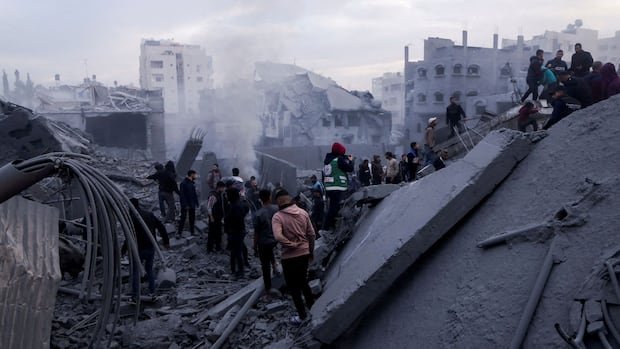In the moments after hearing mediators had finally reached a ceasefire deal to stop the fighting between Israel and Hamas, Amjad Shawa and his family watched from their apartment balcony in Deir Al Balah, in southern Gaza, as dozens of exhilarated neighbours flooded the streets.
Strangers sat on each others’ shoulders and shot fireworks into the night sky. Shawa, who fled his own home in Gaza City more than a year ago, joined the celebrations for a time, despite the nerves rumbling beneath his joy.
“I cannot resist happiness,” he told CBC’s As It Happens in a call from the apartment he’s been sharing with his mother, brother, wife and three children.
“I hope that this will end and we will witness this ceasefire … But I’m afraid, because the politicians get us to this corner each time.”
People poured into the streets in Khan Younis and Deir al-Balah in Gaza on Wednesday as news spread that negotiators had reached a potential phased ceasefire deal.
Negotiators reached a phased deal on Wednesday to end the war in Gaza between Israel and Hamas after 15 months of conflict that has killed tens of thousands of Palestinians and fuelled tension across the Middle East.
The deal includes the gradual release of hostages captured by Hamas-led militants during the Oct. 7, 2023, attacks on Israel, in exchange for Palestinians held in Israeli prisons. It also includes a promise to increase humanitarian aid into the Gaza Strip, which has been laid to waste.
The deal comes after months of start-and-stop negotiations that would raise the hopes of Palestinians and Israelis alike, only for them to be dashed when discussions fell apart. Some Palestinians were wary of celebrating until a permanent ceasefire is firmly in place.
“I have to believe that this time is different and it will work for going forward,” said Shawa, a co-ordinator with the Palestinian NGO Network.
“We are looking to have a permanent ceasefire … We need this to be stopped and to give the peaceful people in Gaza Strip their chance of life as other people [have] all over the world.”
CBC’s senior international correspondent Margaret Evans outlines the questions still lingering about the Israel-Hamas ceasefire agreement that could be the first step in ending a 15-month-long war in Gaza.
Israel launched an all-out assault on Gaza after the attacks of Oct. 7, 2023. By Israeli tallies, attackers killed roughly 1,200 people and took around 250 hostages back to Gaza.
The retaliatory military campaign has killed some 46,000 Palestinians, according to health officials in the enclave. The Palestinian civil emergency service estimates that the bodies of 10,000 people may be trapped under the rubble, which would take the reported death toll to more than 50,000.
“I swear I can’t describe my feelings. Very, very happy and sad at the same time,” Umm Muhammad Wadi, 40, told freelance journalist Mohamed El Saife in Deir Al Balah after hearing about the ceasefire.
“My son was martyred. I will go home and bury him. I want him to go home and rest.”
Israel’s military campaign has reduced much of the Gaza Strip to rubble and pushed most of the territory’s 2.3 million people from their homes multiple times. Palestinian and UN officials had said there were no safe areas left in Gaza.
Humanitarian agencies say they also face acute shortages of food and medicine. A report from Amnesty International in December found Israel’s assault met the legal threshold for the crime of genocide.
Israel, which has repeatedly rejected any allegation of genocide, called the report “entirely false.”
The nation has also denied hindering humanitarian relief to Gaza and said it has facilitated the distribution of hundreds of truckloads of food, water, medical supplies and shelter equipment to warehouses and shelters.
The United Nations said in June that it was Israel’s responsibility, as the occupying power in the Gaza Strip, to restore public order and safety in the Palestinian territory so aid can be delivered.
Hamas came to power in Gaza in 2006 after Israeli soldiers and settlers withdrew in 2005, but the enclave is still deemed Israeli-occupied territory by the United Nations. Israel controls access to Gaza.


